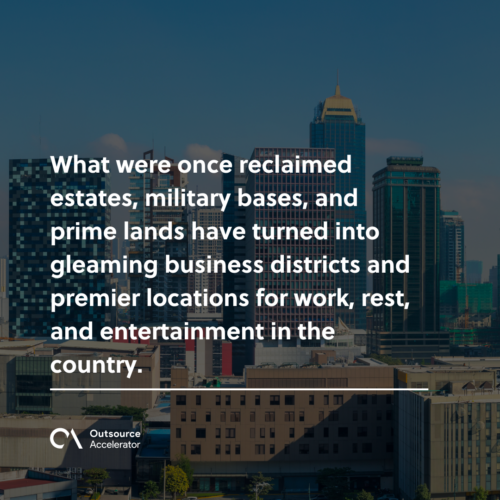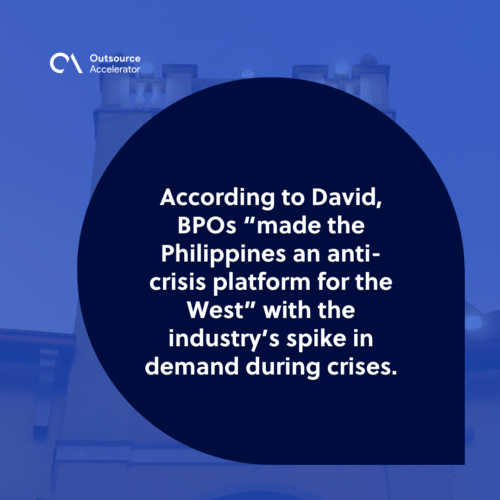Outsourcing and the boom of the property market in the Philippines

The Philippine outsourcing industry contributed to the economic growth that the country benefits from today. It helped expand businesses across the world, creating millions of jobs for Filipinos in the workforce each year.
Moreso, it helped in driving property market growth. For years now, the Philippines has seen a boom in the commercial property market due to the demand for commercial and residential spaces around the country, thanks to outsourcing and overseas remittances.
Leechiu Property Consultants (LPC), a premier real estate consultancy firm, has been at the center of the property market since 2015. CEO and founder David Leechiu shared the brief timeline and progress in the country’s real estate sector in the 349th episode of the Outsource Accelerator podcast.
The Philippine property market and its growth
The real estate market in the Philippines has gone a long way for the last three decades. What were once reclaimed estates, military bases, and prime lands have turned into gleaming business districts and premier locations for work, rest, and entertainment in the country.
With his 26 years of experience in the real estate industry, David has also seen its growth within decades. According to him, resolving past economic issues in the country for the last 20 years lead to the following results:
- The increase in GDP from $1,500 per capita to around $3,300
- Ongoing development of infrastructures in the country

Game changes in the Philippine property market
An article by the Philippine Daily Inquirer called “Turning points in PH real estate” enumerated the milestones and turning points that changed the property market of today. These include:
Liberalization of select industries
During the Ramos era, several industries underwent economic liberalization. This led to the demand for office space due to the expansion of industries such as telecommunications and banking.
Overseas remittances
The demand for real estate has also increased since the early 2000s due to the rising household income brought by overseas remittances. Per the article, the sector “has been in an upswing” with a momentary dip due to the 2009 global financial crisis.
Past regional and global crises
The central bank as well learned a lesson from the Asian Financial Crisis (1997) and the Global Financial Crises (2009) in terms of banks’ real estate exposure. The crises led them to adopt real estate stress testing – a method where banks check the borrower’s capability to make payments at a rate ‘higher than they actually pay’.
Other notable points
Aside from those listed, the property market in the country was as well changed by the following:
- The rising demand for condominium living;
- Additional certifications in building a property;
- The era of technology and digitalization; and
- The onset of the business process outsourcing (BPO) industry
How the property market fared before and during COVID
David agreed that the COVID pandemic is “probably the biggest crisis” in the country for decades.
Before COVID, the property market recorded high gains in both residential and commercial properties. This is paired with the ongoing ‘Build, Build, Build’ projects that aim to improve roads, transportations, and other infrastructures in the country.
LPC saw a record 1.7 million leased office spaces in 2019 – the third-highest demand in the world. This growth was halted at the start of lockdowns in March the same year.
Demand in office spaces was slightly affected by the pandemic due to companies being forced to put their employees in flexible work arrangements. However, as per David, the commercial property remained resilient during these times.
How outsourcing drove the property market resiliency
David credits the outsourcing sector as one of the drivers of economic continuity in the country. According to him, BPOs “made the Philippines an anti-crisis platform for the West” with the industry’s spike in demand during crises.
Indeed, crises show the industry’s countercyclical nature. It not only helps global businesses to stay afloat. It even creates jobs for Filipinos in need during these times.
Aside from this, BPOs continued to pay their office rent during the pandemic while housing skeletal workforces on site.

The commercial property market post-pandemic
David is positive about the future of the commercial property market in the Philippines.
According to him, around 12 to 15 projects under the Build, Build, Build Program are on its stage of completion for the next six months until 2022.
These projects could further develop roads and transport systems in the country, especially in the National Capital Region and its nearby provinces – leading to a “new Philippines” seen by the population as soon as lockdowns ease.
Going back to the office, meanwhile, will be inevitable in most industries including outsourcing. While most companies see an increase in productivity during remote work, David attributes this to their workload getting cut in half.
What’s more, companies as well have concerns about data security and privacy during this setup. With this, companies going back to 100% workload will implement several measures for bringing their employees back to the office.
These factors could further help in recuperating the setbacks brought by the pandemic. As seen by LPC during the first half of 2021, the company saw the demand in office spaces get better, with them completing around 80% (280,000 sq, m.) of their demand the previous year (380,000 sq. m.)
Yet, the company sees the property market to go back to its 2019 demand in the next two to three years.
About Leechiu Property Consultants (LPC)
Established in 2015, LPC helps individuals and corporations navigate the Philippine real estate market. They advise on how their clients can invest in the real estate sector and how they can manage their lease portfolio.
The company has an extensive clientele, including JPMorgan, HSBC, and Citibank. Currently, LPC has “nine out of 11 largest BPOs in the country” as their clients, handling every real estate aspect on their behalf.
Check out their website for inquiries and information on how LPC can help them in the property market. Further, listen to David Leechiu’s podcast episode here..







 Independent
Independent




